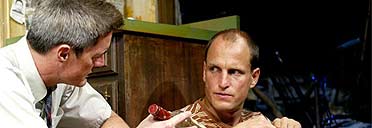
All the world's a stage, but not if you are a foreign actor heading for London's South Bank. The National Theatre has come under fire for casting too many overseas stars at the expense of out-of-work, homegrown talent.
After this year's flood of Hollywood debuts on the West End stage, including Madonna, Gwyneth Paltrow and Woody Harrelson, the British acting community is sceptical of "star struck" commercial casting-agents.
Now the publicly-funded National Theatre has been criticised by Equity, the actors' union, for choosing too many foreign leads for its forthcoming production of A Streetcar Named Desire, headed by the Hollywood actress Glenn Close.
Close is to make her British stage debut as Tennessee Williams's faded southern belle, Blanche DuBois, while two of the other three leads in the quintessentially American play are from the US or Australia.
Trevor Nunn, the National Theatre's artistic director, has been called to meet Equity of ficials, who say his productions are overlooking British talent while 80% of British actors are unemployed. One example was this year's production of Rodgers and Hammerstein's South Pacific, featuring an American, Lauren Kennedy.
Christine Payne, Equity's assistant general secretary for theatre and variety, said: "We are disappointed in the National Theatre. We do not buy the argument that A Streetcar Named Desire is an American production. Their production of Oklahoma! was as American as you can get, yet the stars were British.
"The National Theatre is not a West End commercial venue. It is in receipt of public funds and a standard bearer and national showcase for the art and British talent. I don't think the government provided an extra £25m for subsidised theatre so that foreign actors could be employed."
Equity sought to persuade the National Theatre "not to go down that route in the future" while one West End producer, Jon Conway, told the Times that the American casting was a "mockery".
A spokeswoman for the National Theatre said it had cast the best actors for the roles and broken no union rules. "We have followed correct procedure and we are not quite sure what the fuss is about. Nothing in our constitution says we can only employ British actors. If you take that line, you would have to ask are we going to ban foreign audiences? Should we be doing plays by foreign playwrights?
"Our mission is to present good theatre including new and neglected plays across a wide range. Nobody is suggesting British actors can't play Americans. Iain Glen is playing Stanley Kowalski and the other 15 cast members are British."
She claimed the problem was not US stars coming to London, but British actors moving the other way. Nunn's recent production of Oklahoma! only reached Broadway after a four-year struggle with American actors' unions and most of its British cast, including Maureen Lipman, was prevented from appearing in New York.
British and American actors' unions have an agreement that stars of "international status" such as Close and Madonna can cross the Atlantic with instant work permits. Other performers must take part in a registered exchange to balance numbers. Roughly 40 actors move between the US and UK each year, while the number of American actors in London has grown this year.
British actors have done increasingly well on Broadway in the last two years, with this year's two top Tony awards - Broadway's Oscars - going to Lindsay Duncan and Alan Bates. Duncan won best actress for her role in Private Lives which transferred from the West End. Helen Mirren, Liam Neeson, Alan Rickman and Kate Burton were nominated.
Close is an example of a growing band of Hollywood stars taking pay cuts to appear on the London stage. Jessica Lange played Blanche DuBois in the West End five years ago.

